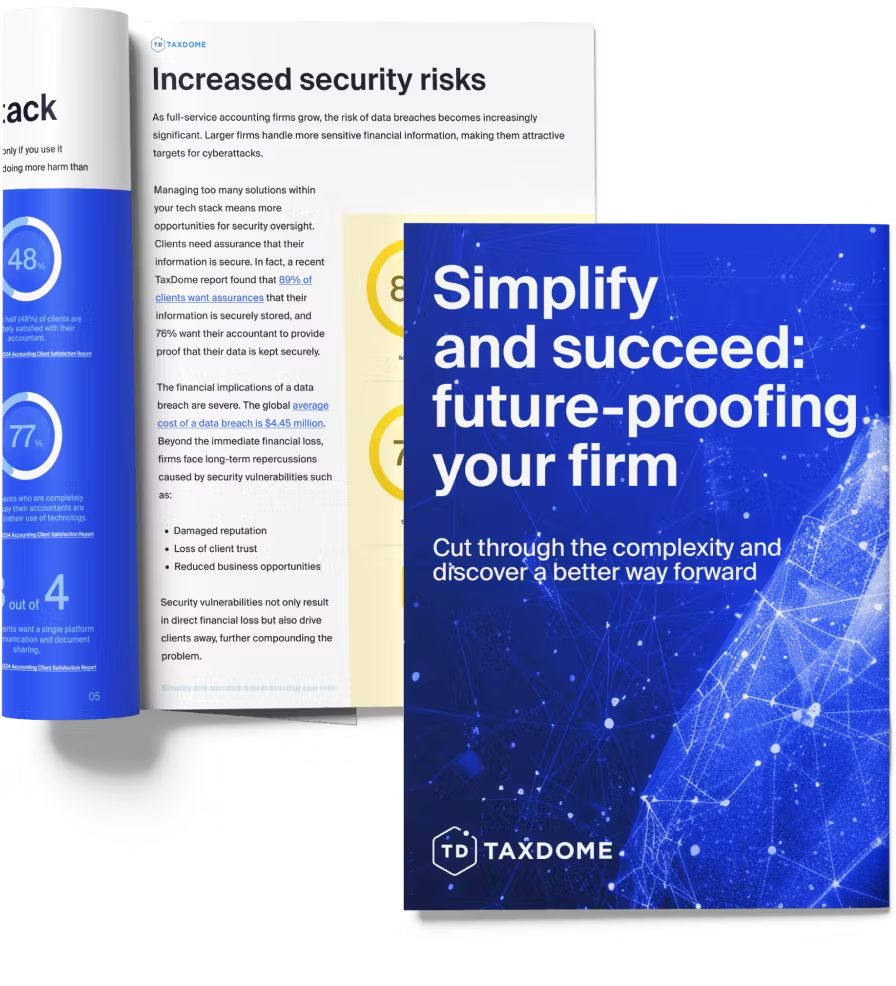
Clients trust your tax or accounting firm with their sensitive, personal data. Access to this data allows you to do your job, including:
- Social security number
- Financial information
- Address, phone number, etc.
Creating a data security plan can help protect your firm’s image, build trust and also keep your clients’ data safe – it’s a win-win for everyone. But creating a plan takes time, analysis, and an understanding of how to protect your business from cyberattacks.
Prioritization of protecting the right data, systems, protocols, and access can go a long way in keeping your client information safe.
Why Is Data Security Important Now More Than Ever?
Every 39 seconds, an Internet-connected computer is hacked. Some of these computers are personal computers, but others are business computers or servers. Web-based attacks happen to 64% of companies, and a data breach costs the average small business a staggering $3.86 million.
The rapid change in technology is driving cyberattacks.
Companies are relying on multiple services to keep their operations running smoothly. Cloud computing, whether for databases, full servers, or even just backing up your internal systems, also increases the risk of data breaches.
Proper hardening of systems and security can prevent attacks, but when 95% of attacks occur due to human error, you must look beyond basic cybersecurity and protect your data from multiple access points.
Multiple Points of Potential Data Security Risks in Tax and Accounting Firms
As an accounting firm grows, you must transition from learning how to protect your company from cyber attacks to creating new protocols that protect data even when it’s shared with others.
Firms have multiple points in their operations where data may be shared with others that can put it at risk, including:
Temporary Staff Hiring
Temporary staff are a point of weakness for many firms. When you hire during a busy season, you have little time to properly train staff and make them aware of all of your policies and protocols.
Internal procedures and security measures can be taken to protect your client data from the inside.
TaxDome allows for firms to:
- Grant limited access to accounts
- Decide stages of access for temporary team members
- Automatically grant access to client data to a specific employee when a task needs to be completed
- Revoke access when an employee completes a task
Hiring Outsourced Staff
When hiring outsourced staff, you may be granting them data that is easier to restrict internally. You should consider all of the data that you share with these individuals and may grant them access to, in certain situations, just the previous year’s information.
Privacy Is More Important Than Security
You must ask yourself why security is more important than privacy? Firms should be focusing on both. A lot of resources are spent on security, but there has been a growing gap in trying to keep data private that is just starting to be closed.
If you keep close control of your client data, create strict access control systems, encrypt data, and take additional measures to keep data private, it will be an integral part of your cybersecurity efforts.
Privacy is more important than security, but privacy and security do work together to keep your firm and client information safe.
You should start with a data security plan before taking additional measures to strengthen your firm’s security.
Creating a Data Security Plan in 5 Simple Steps
Your firm should work with security experts to create a data security plan that offers the best security for your clients. But you should start creating a plan using the following five-step process:
1. Learn the Basics
Data security risks can come from five key areas:
- Exploitation of resources to gain access to data
- Access data through system or data tampering
- Accessing sensitive data while being unauthorized
- Disrupt business services or processes to gain access
- Ransomware, which holds data hostage and blocks access to it
Basic security must protect against the above vulnerabilities while also considering phishing and simpler attacks too.
2. Identify Sensitive Data
Identify what data is the most vital to protect, who has access to the data, and which data, if not protected, would have the least impact on clients or your firm. You need to identify all customer information risks.
3. Evaluate and Consider Risk
Consider all of the risks and then assess the current security measures in place to eliminate these risks. When you know the risks and what security is in place, you can then design a data security plan.
4. Create a Plan to Protect Data
Now, you want to create a plan to protect your most vital data while creating systems and/or protocols to protect against potential risks. You should be working with all stakeholders and security professionals to devise a strategy that provides a robust data security plan.
5. Implement and Monitor
Once a plan is in place, you need to implement the plan and continually monitor and test the plan. You’ll need to adjust the plan, review it and monitor it routinely to ensure that your firm is doing all it can to keep your data safe and secure.
4 Additional Tips to Strengthen Your Firm’s Security
Creating a data security plan is only part of the data security process. You need to take actionable steps to begin protecting your client data as fast as possible, including:
1. Two-factor Authentication
Tax and accounting providers should implement two-factor authentication for internal accounts. Enabling two-factor authentication requires an additional step to be taken to enter an account.
If a hacker uses a brute force attack to crack a password or gets access to the password through a key logger or some other measure, the additional step required further secures the account. At TaxDome, we offer:
- Two-factor authentications
- Biometric authentications
2. Put Policies in Place
Internal policies can help keep client data safe and secure, including requiring:
- Workers sign NDAs
- Create and Implement IT/cybersecurity policies
- Ensure workers are trained on and sign policies
Creating strong internal policies, along with the help of key shareholders and security experts, can help stop potential threats in their tracks.
You can also train employees on best practices and protocols, such as not emailing clients or sending messages outside of a secure messaging system or portal.
3. Secure Client Portal and Messaging Systems
One of the biggest mistakes a firm can make is to request client personal data via email. Instead, using a secure client portal and messaging system offers better protection than sending information through text or email.
Securing data sharing through internal software and systems reduces the risk of client data being exposed.
TaxDome’s client portal and secure messages system integrates both features in one secure portal.
4. Follow Basic Security Practices
Whether an employee is working from home or is using your internal computers, there are base measures that must be taken to harden your firm’s security:
- Install a firewall
- Install antivirus/malware protection
- Keep firewall and antivirus updated
- Keep operating systems updated
- Restrict access to program installs on company computers
Hackers will try to infiltrate your systems using the easiest method possible. If you don’t patch a system or software and there’s a known security issue, the hacker will use this known vulnerability to access the data.
Final Thoughts
Why is data security important now more than ever? The industry is evolving and changing. Online services, from SaaS solutions to simple cloud backup of client information, can leave security risks open to your business and clients.
If you’re not continually trying to strengthen your data security, you’re putting your clients and firm at risk of a data breach.

Thank you! The eBook has been sent to your email. Enjoy your copy.
There was an error processing your request. Please try again later.
What makes the best accounting firms thrive while others struggle to keep up? We analyzed our top 20 TaxDome firms, representing over $100M in combined revenue, to uncover the strategies driving their success.



